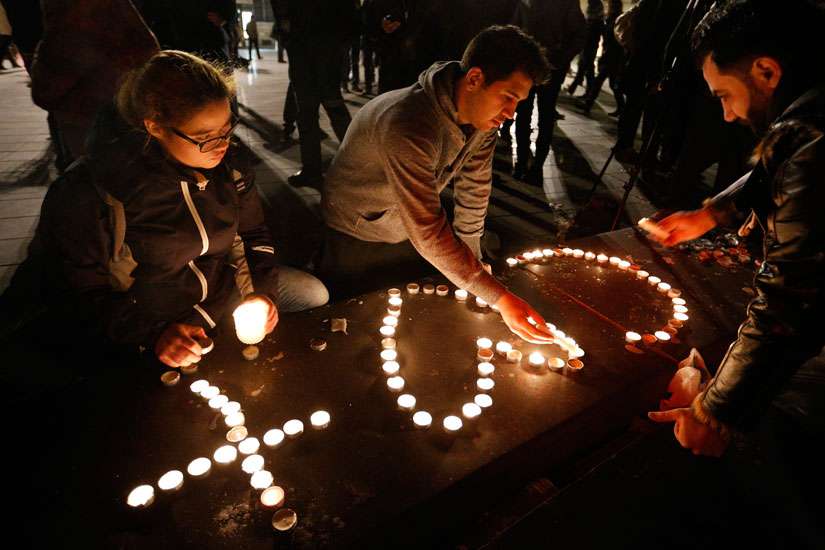Crosby, president of the Canadian Conference of Catholic Bishops, understands the initial reaction of uncertainty and even fear when faced by news of another devastating terror attack. But that gut reaction can’t define us, he said.
“If we’re trying to build a culture of life, we can’t let fear control us,” he said.
Crosby chose not to weigh in on debates over whether Canada should reconsider its decision to withdraw from U.S.-led bombing of ISIS targets in Syria and Iraq, or whether to slow down the acceptance of 25,000 Syrian refugees because there might be terrorists hiding among them.
“I’m not in the political realm around this,” he said.
But he emphasized that his Hamilton diocese is proceeding as planned with refugee sponsorships.
“(Immigration Minister John) McCallum has tried to reassure Canadians that they are working with the security personnel to assure that the necessary checks are in place,” said Crosby. “We have confidence in that. We take him at his word.”
As other nations increase the air war against ISIS in Syria and Iraq, Prime Minister Justin Trudeau has confirmed he will keep an election promise and withdraw Canada’s CF-18 warplanes from the conflict before next March. Instead, Canada will send more armed forces personnel to the region to help train local troops.
Despite growing security concerns following the Paris attacks, Trudeau also pledged to stand firm on a government commitment to bring 25,000 Syrian refugees to Canada by the end of the year.
“The war cannot be won by foreign jets,” said CJI executive director Jenny Cafiso. “Local players need to be engaged.”
The Jesuit agency also supports continued refugee sponsorship, and believes a greater humanitarian role for Canada is more likely to lead to peace.
“There are 4.2 million registered UNHCR refugees in neighbouring countries,” Cafiso said. “Most refugees don’t want to leave the region, because they want to return to their country once there is peace. One of the reasons people are leaving the places they have escaped to is because of insufficient humanitarian aid, both inside Syria and in the neighbouring countries.”
Crosby was speaking two days after an arson attack on the lone mosque in Peterborough, Ont., did an estimated $80,000 in damage.
“It should engender, at least minimally, disappointment,” said Crosby of the Peterborough attack. “It’s the wrong response.”
Peterborough Bishop William McGrattan expressed shock when he heard that the Masjid Al-Salaam (“The Mosque of Peace”) had been torched.
“It’s devastating not only for the Muslim community but for all of the Peterborough community that such places of worship should become places of violence and expressions of hatred,” McGrattan told The Catholic Register.
A day after the arson attack, an online fundraising campaign for the mosque was launched and, in just 43 hours, it raised $110,548 from 2,098 donors.
Currently 25 per cent of Peterborough’s parishes have committed to sponsor refugees, said McGrattan.
The Canadian Conference of Catholic Bishops responded officially to the Paris attacks with a letter to Paris Archbishop Cardinal André Vingt-Trois.
“We join our voices with those of other religious leaders who remind the world that peace, respect for the human person and integral human development remain essential criteria for all religions and their faithful,” said the letter signed by Crosby. “With God’s grace and the goodwill of all people, peace and justice will endure and be more appealing and effective than violence and hatred.”
Crosby recommends that Catholics look at paragraph 23 of Pope Francis’s bull declaring the Year of Mercy starting Dec. 8.
“Among the privileged names that Islam attributes to the Creator are ‘Merciful and Kind.’ This invocation is often on the lips of faithful Muslims who feel themselves accompanied and sustained by mercy in their daily weakness,” wrote the Pope. “They too believe that no one can place a limit on divine mercy because its doors are always open.”
The Pope goes on to call for a renewed and deeper interfaith dialogue among Catholics, Jews and Muslims during the Year of Mercy.
In Toronto, efforts to bring in more Syrian refugees continue, said Archdiocese of Toronto spokesman Neil MacCarthy. Project Hope in support of Syrian refugees has raised $2.5 million, 83 per cent of its $3-million goal.
“We are moving forward with our plan to bring 100 refugee families through Project Hope to the Archdiocese of Toronto,” MacCarthy said.
In Istanbul for a faith leader’s meeting running parallel with G-20 meetings, Canadian Council of Churches executive director Karen Hamilton rejected calls for a slowdown to bring in Syrian refugees by Jan. 1.
“Go slow on bringing in Syrian refugees? No! Go faster,” said Hamilton.


